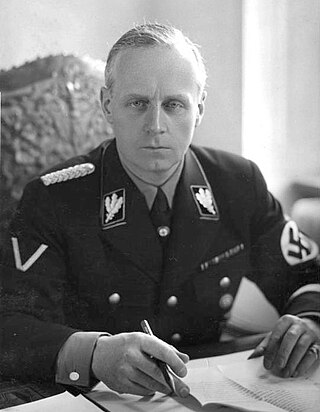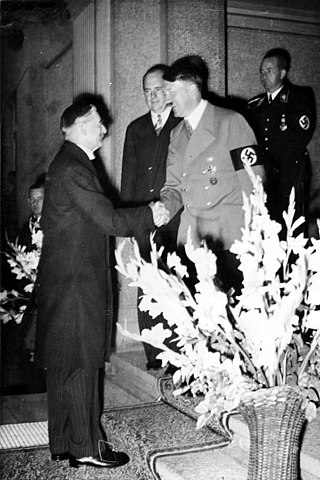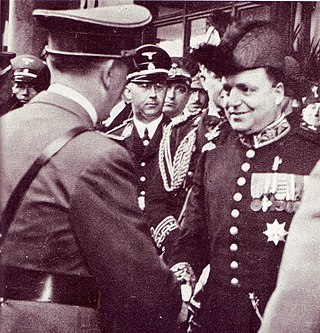
Ulrich Friedrich Wilhelm Joachim von Ribbentrop was a German politician and diplomat who served as Minister of Foreign Affairs of Nazi Germany from 1938 to 1945.

The Axis powers, originally called the Rome–Berlin Axis, was a military coalition that initiated World War II and fought against the Allies. Its principal members were Nazi Germany, the Kingdom of Italy, and the Empire of Japan. The Axis were united in their opposition to the Allies, but otherwise lacked comparable coordination and ideological cohesion.

The Tripartite Pact, also known as the Berlin Pact, was an agreement between Germany, Italy, and Japan signed in Berlin on 27 September 1940 by, respectively, Joachim von Ribbentrop, Galeazzo Ciano and Saburō Kurusu. It was a defensive military alliance that was eventually joined by Hungary, Romania, Bulgaria and Yugoslavia as well as by the German client state of Slovakia. Yugoslavia's accession provoked a coup d'état in Belgrade two days later. Germany, Italy and Hungary responded by invading Yugoslavia. The resulting Italo-German client state, known as the Independent State of Croatia, joined the pact on 15 June 1941.

The Munich Agreement was an agreement concluded at Munich on 30 September 1938, by Germany, the United Kingdom, France, and Italy. It provided "cession to Germany of the Sudeten German territory" of Czechoslovakia, despite the existence of a 1924 alliance agreement and 1925 military pact between France and the Czechoslovak Republic, for which it is also known as the Munich Betrayal. Most of Europe celebrated the Munich agreement, which was presented as a way to prevent a major war on the continent. The four powers agreed to the German annexation of the Czechoslovak borderland areas named the Sudetenland, where more than three million people, mainly ethnic Germans, lived. Adolf Hitler announced that it was his last territorial claim in Northern Europe.

Appeasement, in an international context, is a diplomatic policy of making political, material, or territorial concessions to an aggressive power to avoid conflict. The term is most often applied to the foreign policy of the British governments of Prime Ministers Ramsay MacDonald, Stanley Baldwin and Neville Chamberlain towards Nazi Germany and Fascist Italy between 1935 and 1939. Under British pressure, appeasement of Nazism and Fascism also played a role in French foreign policy of the period but was always much less popular there than in the United Kingdom.

The Pact of Steel, formally known as the Pact of Friendship and Alliance between Germany and Italy, was a military and political alliance between Italy and Germany.

The Anti-Comintern Pact, officially the Agreement against the Communist International was an anti-Communist pact concluded between Nazi Germany and the Empire of Japan on 25 November 1936 and was directed against the Communist International (Comintern). It was signed by German ambassador-at-large Joachim von Ribbentrop and Japanese ambassador to Germany Kintomo Mushanokōji. Italy joined in 1937, but it was legally recognised as an original signatory by the terms of her entry. Spain and Hungary joined in 1939. Other countries joined during World War II.
The Abyssinia Crisis was an international crisis in 1935 that originated in what was called the Walwal incident during the ongoing conflict between the Kingdom of Italy and the Empire of Ethiopia. The League of Nations ruled against Italy and voted for economic sanctions, but they were never fully applied. Italy ignored the sanctions, quit the League, made special deals with the United Kingdom and France and ultimately annexed and occupied Abyssinia after it had won the Second Italo-Ethiopian War. The crisis is generally regarded as having discredited the league.
The events preceding World War II in Europe are closely tied to the bellicosity of Fascist Italy, Nazi Germany, and Imperial Japan, as well as the Great Depression. The peace movement led to appeasement and disarmament.

The Stresa Front was an agreement made in Stresa, a town on the banks of Lake Maggiore in Italy, between French prime minister Pierre-Étienne Flandin, British prime minister Ramsay MacDonald, and Italian prime minister Benito Mussolini on April 14, 1935. Formally called the Final Declaration of the Stresa Conference, its aim was to reaffirm the Locarno Treaties and to declare that the independence of Austria "would continue to inspire their common policy". The signatories also agreed to resist any future attempt by the Germans to change the Treaty of Versailles. Pat Buchanan in Churchill, Hitler and the Unnecessary War, wrote that "the Stresa Front was the most important attempt to stop Hitler before the start of WW2". However, the Stresa Front began to collapse after the United Kingdom signed the Anglo-German Naval Agreement in June 1935 in which Germany was given permission to increase the size of its navy. It broke down completely within two to three months of the initial agreement, just after the Italian invasion of Abyssinia.

The causes of World War II, a global war from 1939 to 1945 that was the deadliest conflict in human history, have been given considerable attention by historians from many countries who studied and understood them. The immediate precipitating event was the invasion of Poland by Nazi Germany on September 1, 1939, and the subsequent declarations of war on Germany made by Britain and France, but many other prior events have been suggested as ultimate causes. Primary themes in historical analysis of the war's origins include the political takeover of Germany in 1933 by Adolf Hitler and the Nazi Party; Japanese militarism against China, which led to the Second Sino-Japanese War; Italian aggression against Ethiopia, which led to the Second Italo-Ethiopian War and Germany's initial success in negotiating the Molotov–Ribbentrop Pact with the Soviet Union to divide the territorial control of Eastern Europe between them.

Milan Stojadinović was a Serbian and Yugoslav politician and economist who served as the Prime Minister of Yugoslavia from 1935 to 1939. He also served as Foreign Minister from 1935 to 1939 and as Minister of Finance three times.

In the history of the 20th century, the interwar period lasted from 11 November 1918 to 1 September 1939, the end of the First World War to the beginning of the Second World War. The interwar period was relatively short, yet featured many significant social, political, and economic changes throughout the world. Petroleum-based energy production and associated mechanisation led to the prosperous Roaring Twenties, a time of both social mobility and economic mobility for the middle class. Automobiles, electric lighting, radio, and more became common among populations in the developed world. The indulgences of the era subsequently were followed by the Great Depression, an unprecedented worldwide economic downturn that severely damaged many of the world's largest economies.

The remilitarization of the Rhineland began on 7 March 1936, when German military forces entered the Rhineland, which directly contravened the Treaty of Versailles and the Locarno Treaties. Neither France nor Britain was prepared for a military response, so they did not act. After 1939 commentators often said that a strong military move in 1936 might have ruined Hitler's expansionist plans. However, recent historiography agrees that both public and elite opinion in Britain and France strongly opposed a military intervention, and neither had an army prepared to move in.

The Italian colonial empire, known as the Italian Empire between 1936 and 1943, began in Africa in the 19th century and comprised the colonies, protectorates, concessions and dependencies of the Kingdom of Italy. In Africa, the colonial empire included the territories of present-day Eritrea, Somalia, Libya, and Ethiopia; outside Africa, Italy possessed the Dodecanese Islands, Albania, and had a concession in China.
The 1941 Treaties of Rome were a series of treaties concluded by the Fascist Italian regime and the World War II collaborationist Independent State of Croatia on 18 May 1941, following the Axis Invasion of Yugoslavia. The treaties determined the borders between the NDH and Italy, effectively ceding territory largely organised as the Governorate of Dalmatia to the latter. They also prohibited the NDH from deploying naval forces to the Adriatic Sea, and restricted movement of its troops in the Italian-controlled part of the NDH.
The history of German foreign policy covers diplomatic developments and international history since 1871.

The Kingdom of Italy was governed by the National Fascist Party from 1922 to 1943 with Benito Mussolini as prime minister. The Italian Fascists imposed authoritarian rule and crushed political and intellectual opposition, while promoting economic modernization, traditional social values and a rapprochement with the Roman Catholic Church.

Hans Georg von Mackensen was a German diplomat who served at different stages as "State Secretary" at the Foreign Ministry, German ambassador in Rome and a SS senior Group Leader ("Gruppenführer").

Giuseppe Mastromattei was an Italian Fascist politician and civil servant, who served as prefect of Bolzano from 1933 to 1940. He was the longest serving prefect of the province of Bolzano and oversaw the forced Italianization of South Tyrol under the Fascist regime, as well as the South Tyrol Option Agreement of 1939.
















